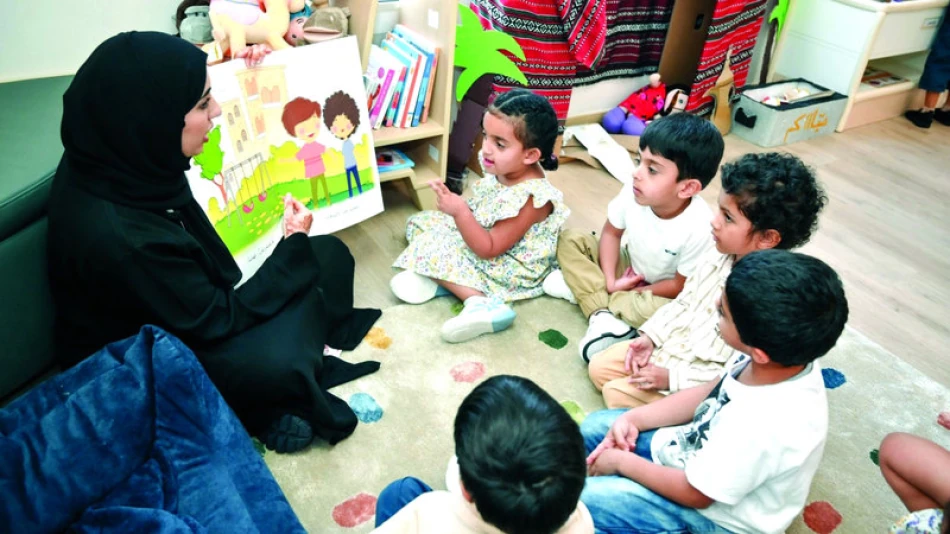
Unlock the Power of 20 Minutes: Discover How Daily Reading Can Boost Your Vocabulary by 2 Million Words Annually
Abu Dhabi's 20-Minute Reading Formula: A Blueprint for Combating Global Educational Decline
Abu Dhabi's Department of Education and Knowledge has unveiled compelling data showing that children who read just 20 minutes daily are exposed to over two million words annually and achieve 90% or higher on standardized tests. This evidence-based approach comes as educational authorities worldwide grapple with "summer learning loss" and declining literacy rates, positioning the UAE as a leader in practical educational solutions.
The Science Behind Daily Reading Habits
The department's findings align with international research demonstrating the exponential benefits of consistent reading practice. Children who maintain a 20-minute daily reading routine don't just improve their vocabulary—they fundamentally rewire their cognitive processing abilities. This data-driven approach reflects Abu Dhabi's broader strategy of using measurable outcomes to guide educational policy, similar to successful models in Singapore and Finland.
Nine Strategic Pillars for Reading Success
Abu Dhabi's framework includes nine evidence-based strategies: individual support, role modeling, choice empowerment, group reading, word tracking, reading aloud, sight word recognition, reading to friendly audiences, and documenting reading activities through photography and video.
The individual support strategy recognizes that each child's learning profile requires customized approaches—a departure from one-size-fits-all educational models that have dominated traditional systems. Meanwhile, role modeling leverages the powerful psychological principle of observational learning, where children naturally emulate their parents' reading behaviors.
Market Implications for EdTech and Publishing
This systematic approach signals significant opportunities for educational technology companies and publishers targeting the Middle East market. The emphasis on choice empowerment and visual documentation suggests growing demand for platforms that offer personalized reading experiences and progress tracking capabilities.
The UAE's focus on measurable literacy outcomes also indicates a maturing education market that prioritizes data-driven results over traditional teaching methods. This trend mirrors developments in South Korea and Estonia, where government-backed literacy initiatives have created robust ecosystems for educational innovation.
Global Context: The Summer Learning Loss Challenge
Abu Dhabi's proactive stance on "summer cognitive decline" addresses a phenomenon that costs students worldwide an average of 2.6 months of learning annually. Unlike reactive approaches seen in many Western systems, the UAE is implementing preventive strategies that maintain educational momentum year-round.
This approach contrasts sharply with countries like the United States, where summer learning loss disproportionately affects low-income students and contributes to widening achievement gaps. Abu Dhabi's systematic framework could serve as a model for other nations seeking to eliminate seasonal educational disruption.
Strategic Positioning in the Knowledge Economy
The initiative aligns with the UAE's broader National Reading Strategy, positioning the country as a regional hub for educational excellence. By establishing measurable literacy benchmarks and providing practical implementation tools, Abu Dhabi is creating a competitive advantage in attracting international talent and investment.
The emphasis on reading culture rather than mere academic compliance suggests a long-term vision for developing critical thinking capabilities essential for the knowledge economy. This strategic positioning could enhance the UAE's appeal to multinational corporations seeking educated workforces and innovative business environments.
Implementation Challenges and Opportunities
While the framework appears comprehensive, its success will depend on consistent implementation across diverse socioeconomic backgrounds. The strategy's emphasis on parental involvement may face challenges in households where parents have limited literacy skills or time availability.
However, the integration of technology through photo and video documentation creates opportunities for community support networks and peer learning systems. This approach could be particularly effective in the UAE's multicultural environment, where traditional family structures vary significantly across expatriate communities.
Most Viewed News

 Sara Khaled
Sara Khaled






